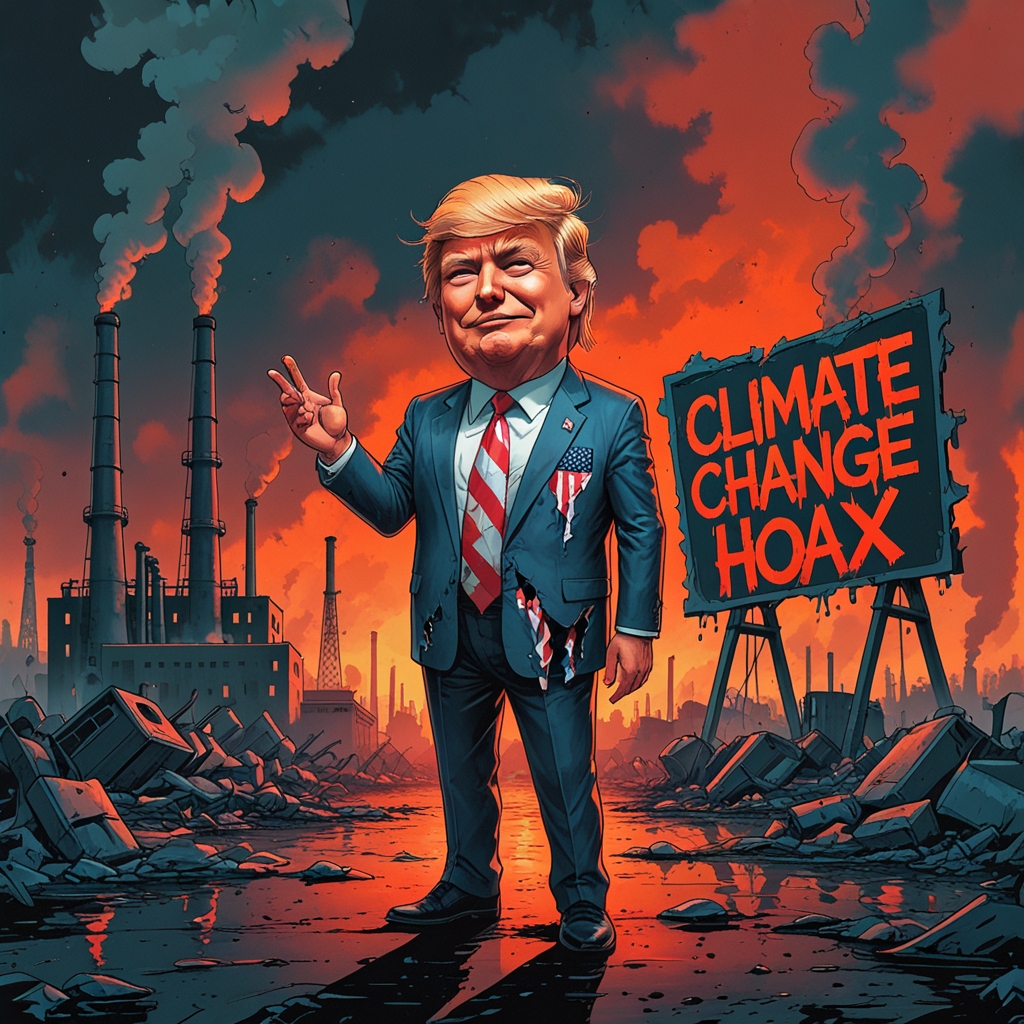
The United States is undergoing a dramatic shift in climate policy under the Trump administration, with the Environmental Protection Agency (EPA) drafting a proposal to eliminate all federal limits on greenhouse gas emissions from coal and gas-fired power plants.
This move, which would reverse key Biden-era climate regulations, raises urgent questions about the global response to climate change, particularly in Europe. Is Europe following the US lead in retreating from climate action, or is it holding firm in the face of American deregulation?
Sweeping deregulation in the US
The EPA’s draft regulation, submitted to the White House in early May, argues that carbon dioxide and other greenhouse gases from fossil fuel plants “do not contribute significantly to dangerous pollution” or climate change. This position starkly contradicts the scientific consensus and the United Nations’ assessment that fossil fuels are responsible for over 75% of global greenhouse gas emissions and nearly 90% of carbon dioxide emissions.
EPA Administrator Lee Zeldin has defended the move as necessary to ensure Americans have access to “reliable and affordable energy,” while also complying with legal requirements. The Trump administration’s broader environmental rollback includes cutting funding for climate initiatives and eliminating grants for air pollution reduction, with Zeldin declaring “the most consequential day of deregulation in US history”.
Impact on US climate policy
The EPA’s proposal would undo regulations finalised under President Biden, which required existing coal plants and new natural gas facilities to cut emissions by 90% if they planned to operate beyond 2039. These rules, announced in April 2024, represented the first legal limits on heat-trapping pollution from coal-fired power plants and were expected to accelerate emissions reductions from the U.S. power sector.
Industry groups and Republican lawmakers have challenged these regulations, arguing they are “unlawful, unreasonable and unachievable,” and threaten grid reliability by mandating “inadequately demonstrated technology”. Yet, research from Princeton suggests the Biden rules could have doubled emissions reductions from the power sector, cutting emissions by 51% by 2040.
Europe’s Response: Holding the line or turning away?
While the US is moving aggressively to dismantle climate protections, Europe’s trajectory remains distinct. The European Union has historically positioned itself as a global leader on climate action, enshrining ambitious targets in the European Green Deal and committing to net-zero emissions by 2050. European governments and institutions have repeatedly criticized US rollbacks and reaffirmed their commitment to the Paris Agreement, even during previous periods of American withdrawal.
There is no evidence from current reporting that Europe is following the U.S. in turning its back on the climate change threat. On the contrary, the EU continues to push forward with policies to phase out coal, expand renewable energy, and tighten emissions standards. European leaders have publicly condemned US deregulation efforts, viewing them as a threat not only to global climate progress but also to transatlantic cooperation on environmental issues.
Global implications and the path forward
The Trump administration’s deregulatory agenda is likely to undermine global climate efforts, given the US’s status as one of the world’s largest emitters. Environmental groups warn that eliminating power plant emissions caps could erase expected reductions of 1.3 billion tons of carbon pollution over 25 years. The EPA’s rationale—that US emissions are a “minor and decreasing portion of global emissions”—is widely disputed by scientists and international bodies.
However, the EU’s regulatory framework, carbon pricing mechanisms, and investment in clean technologies signal a commitment to climate action that persists despite political headwinds in the US.
Want to go deeper? Continue reading.
A global perspective with a focus on India’s climate Leadership
The Trump administration’s latest move to dismantle all federal limits on greenhouse gas emissions from coal and gas-fired power plants represents a profound shift in American climate policy. The EPA now contends that emissions from fossil fuel plants “do not contribute significantly to dangerous pollution” or climate change—a position at odds with the scientific consensus and the commitments made under the Paris Agreement.
This reversal has prompted widespread concern about the potential for lasting harm to global climate efforts. But is the damage truly irreversible, and how are other major economies, such as India, responding to this challenge?
Trump’s climate rollback: Scope and impact
Since returning to office, President Trump has aggressively pursued deregulation in the environmental sector. The EPA’s draft proposal to eliminate emissions caps is the latest in a series of actions, including slashing funding for climate initiatives and rolling back regulations that required power plants to cut emissions by 90% if operating beyond 2039. EPA Administrator Lee Zeldin has justified these moves as necessary for “reliable and affordable energy,” but critics argue they will increase carbon pollution and undermine hard-won progress.
The regulations now under threat were projected to eliminate 1.3 billion tonnes of carbon pollution over 25 years. According to Princeton research, the Biden-era rules could have doubled emissions reductions from the power sector, cutting emissions by 51% by 2040. If finalised, the rollback would not only stall this progress but could set a precedent for other countries to weaken their own climate commitments.
Is the damage irreversible?
The question of irreversibility is complex. Climate change is a cumulative challenge: every year of delay locks in higher emissions, making it more difficult and costly to limit global warming. Policy reversals in the United States—one of the world’s largest emitters—can have outsized effects, both by increasing emissions and by undermining international trust and momentum.
However, US environmental policy is subject to change with each administration. While Trump’s actions may cause significant short-term harm, future leaders could restore or even strengthen climate regulations. The EPA’s proposal still faces legal challenges and a lengthy review process, meaning the final outcome remains uncertain. The greatest risk may be to global confidence and investment in clean energy, as policy instability can deter the long-term planning needed for deep decarbonisation.
Europe and India: Contrasting approaches
While the US under Trump is retreating from climate action, Europe has largely maintained its commitment to ambitious climate targets and the Green Deal. European leaders have publicly criticised the US rollback and reaffirmed their dedication to the Paris Agreement.
India, meanwhile, has emerged as a significant player in the global fight against climate change, taking several noteworthy initiatives:
- Ambitious Targets: India has pledged to reach net-zero emissions by 2070 and to reduce the carbon intensity of its economy by more than 45% by 2030, compared to 2005 levels.
- Renewable Energy Expansion: As of March 2025, India’s installed renewable energy capacity reached 220.10 GW, with a record annual addition of nearly 30 GW in 2024–25. The country aims for 500 GW of non-fossil fuel-based capacity by 2030, a central pillar of its ‘Panchamrit’ commitments.
- National Action Plan on Climate Change (NAPCC): Launched in 2008, this comprehensive strategy includes missions focused on solar energy, energy efficiency, sustainable habitats, water, and more.
- International Solar Alliance (ISA): India co-founded this global coalition to promote solar energy deployment among “sunshine countries,” reducing reliance on fossil fuels.
- Innovative Adaptation and Mitigation: India is implementing measures such as urban climate adaptation, air pollution control, coastal ecosystem conservation, and reforestation using the Miyawaki technique, among others.
- Emissions Reductions: India has achieved a 7.93% drop in greenhouse gas emissions, demonstrating progress towards its climate goals despite developmental challenges.
Damage, but not destiny
President Trump’s deregulatory agenda is a setback for global climate action, threatening to increase emissions, disrupt international cooperation, and slow the transition to a low-carbon future. However, the damage is not necessarily irreversible. The resilience of international agreements, the determination of other major economies—especially the European Union and India—and the potential for future US policy reversals mean that hope remains.
India’s proactive stance and ambitious targets offer a compelling example of climate leadership in the Global South, even as the US falters. The fight against climate change is a marathon, not a sprint. While Trump’s actions may hinder progress in the short term, the world’s collective resolve and innovation can still drive the transition to a more sustainable and climate-resilient future.



